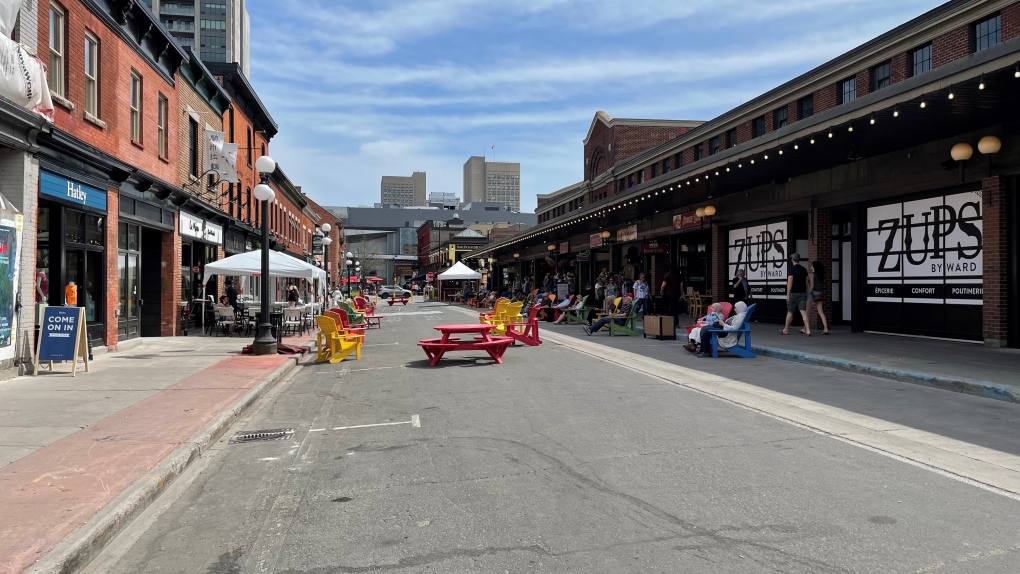COVID-19 levels still high in Ottawa, top doctor warns
 Ottawa's ByWard Market on Thursday, May 12. (Josh Pringle/CTV News Ottawa)
Ottawa's ByWard Market on Thursday, May 12. (Josh Pringle/CTV News Ottawa)
Ottawa's top doctor warns that COVID-19 transmission rates are still high in the community, and people should still try to limit close contacts, wear a mask in indoor settings and be up to date on COVID-19 vaccinations to limit your risks during this warm spring weather.
"That wastewater indicator tells us we still have more COVID-19 in the community than we did in January, which was very high," medical officer of health Dr. Vera Etches told Newstalk 580 CFRA's Ottawa at Work with Leslie Roberts.
"We are still asking people to be mindful of their risk and take those steps we know make a difference to reduce your risk of severe illness."
Ottawa Public Health reported levels of COVID-19 remain high in the community this week, while hospitalizations are stable.
"Overall, we are encouraged that the different things we measure like wastewater and outbreaks that are occurring, they're showing signs of improvement but the levels are still high," Etches said Thursday.
"I think that probably resonates with people, because people are still getting sick. So fortunately, we do have these layers of protection, the vaccination that's keeping people out of hospital."
The health unit says you can lower your risk of contracting COVID-19 by socializing outdoors this spring, and wearing a mask when in indoor and/or crowded places.
Roberts asked Etches if she has adjusted her position of wearing a mask in indoor, public places.
"Not at this point because of what I say is in terms of still seeing that high level. It still does mean that when you are indoors with a lot of people and there aren't masks you have a higher likelihood of being exposed to COVID," Etches said.
"We know that people are doing their own risk assessment; so individuals who recently had COVID feel that they are younger, they are not at risk of severe illness, they're maybe not as often choosing to wear masks."
The medical officers of health for the Niagara Region, Peterborough and Windsor-Essex sent a letter to Ontario's chief medical officer of health last week, asking the province to reinstate mask mandates for schools and indoor public settings.
Ottawa Public Health told CTVNewsOttawa.ca this week that it's "supportive of measures that can be taken to increase mask use during the resurgence, including policies in specific buildings, workplaces and community settings, including schools and child care."
OPH says it has no plans to introduce any local measures to require masks in schools at this time.
Ottawa Public Health continues to "highly recommend" residents practice these measures to limit the spread of COVID-19:
- Wearing a mask
- Avoiding crowded areas
- Limit close contacts
- Being up-to-date with COVID-19 vaccinations, especially third doses, and fourth doses for immunocompromised people and those aged 60 plus
- Staying home if you’re not feeling well
- Awareness of the need to access antiviral treatment early in the course of infection, for those at higher risk
CTVNews.ca Top Stories

Breast cancer screening should start at age 40, Canadian Cancer Society says
The Canadian Cancer Society says all provinces and territories should lower the starting age for breast cancer screening to 40.
DEVELOPING Live updates as Stormy Daniels testifies at Trump hush money trial
Adult film star Stormy Daniels is on the stand a second time Thursday as former U.S. president Donald Trump’s hush money case continues in Manhattan. Follow live updates here.
Ontario family receives massive hospital bill as part of LTC law, refuses to pay
A southwestern Ontario woman has received an $8,400 bill from a hospital in Windsor, Ont., after she refused to put her mother in a nursing home she hated -- and she says she has no intention of paying it.
Canadian-Israeli man shot dead in Egypt; claim links killing to Gaza
A Canadian man 'of Jewish Israeli descent' has been shot dead in the Egyptian city of Alexandria in a suspected criminal case, a security source said, while a previously unknown militant group said it carried out the attack in reaction to the war in Gaza.
Here are the ultraprocessed foods you most need to avoid, according to a 30-year study
Studies have shown that ultraprocessed foods can have a detrimental impact on health. But 30 years of research show they don’t all have the same impact.
Ontario man frustrated after $3,500 paving job leaves driveway in shambles
An Ontario man considering having his driveway paved received a quote from a company for $7,000, but then, another paver in the neighbourhood knocked on his door and offered half that rate.
Why these immigrants to Canada say they're thinking about leaving, or have already moved on
For some immigrants, their dreams of permanently settling in Canada have taken an unexpected twist.
BREAKING Sheldon Keefe out as head coach of Toronto Maple Leafs
The Toronto Maple Leafs have fired head coach Sheldon Keefe. The team made the announcement Thursday after the Original Six franchise lost to the Boston Bruins in seven games in the first round of the Stanley Cup playoffs.
Boeing 737 catches fire and skids off the runway at a Senegal airport, injuring 10 people
A Boeing 737-300 plane carrying 85 people skidded off a runway at the airport in Dakar, Senegal's capital, injuring 10 people, according to the transport minister, an airline safety group and footage from a passenger that showed the aircraft on fire.


































